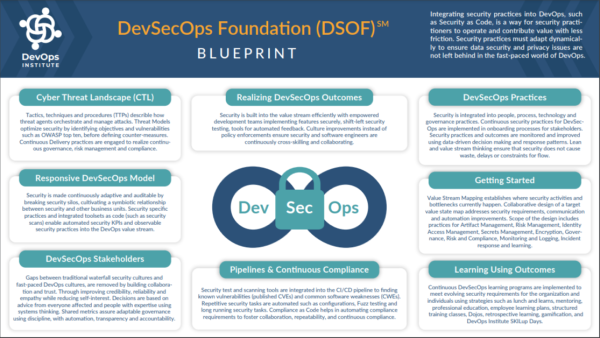Got a question? Call 1800 853 276 | Login
Amid the many discussions on cyber security, IT professionals began dropping the term "DevSecOps" and turning to application and software development as another critical area to secure.
But what is DevSecOps, and how is it different from DevOps? If you ask our technical instructors, they will tell you immediately that it is, first and foremost, a mindset. And one that builds from DevOps.
From DevOps to DevSecOps
DevOps is a set of philosophies, practices and tools that make app and service delivery faster and more efficient: traditional software development and infrastructure management processes. This speed enables organisations to serve their customers better and compete more effectively in the market.
Here, development and operations staff work together to deploy iterations of a product based on a cycle of planning, building, testing, releasing, monitoring, and planning again.
Previously, app and software teams worked separately from those in charge of IT security. And often, testing a product for security was an afterthought that posed risks and delays to product deployment if a threat was found.
DevSecOps combines the words "development", "security", and "operations". It is an approach that focuses on integrating security as a shared responsibility throughout the entire software development lifecycle. This mindset makes security an integral part of the development process.
Incorporating processes like testing and risk mitigation earlier in the workflow prevents the time-intensive and expensive consequences of addressing security breaches post-launch.
Rather than a case of DevOps vs DevSecOps, the latter is an evolution of the development process, moving from a collaboration between only developers and operations teams to one where security specialists are critical parts of a project.
Why Should You Learn DevSecOps?
Understanding the mindset and gaining a certification helps you work better in teams with application or software development projects. Doing so can shorten cycles and quicken the team's response times to issues. Groups applying the philosophy in practice can increase efficiency and test new features.
DevSecOps emphasises automation. And this reduces the strain on the team; they can test and review more efficiently and focus on strategy and problem-solving. Additionally, automation reduces the potential for human errors as an entry point for cyber security threats.
Ultimately, knowing DevSecOps helps deliver better quality and more secure software for the intended end users.
Which DevSecOps Certification is Right for You?
Organisations like Practical DevSecOps and the DevOps Institute (DOI) develop DevSecOps certification programs for IT and security professionals. These programs include instructor-led training and self-paced learning, both available at Lumify Work, to prepare students for a DevSecOps certification. You can select a certification based on your current level and learning preferences.
DevSecOps Foundation
Perfect for non-technical business leaders, operations leaders, SCRUM masters, project managers, business analysts, and maintenance and support staff. It is also suited for technical leaders, IT managers, delivery staff, and quality assurance teams.
This non-technical course discusses the approach and mindset of DevSecOps. For the more technical students, it helps them view DevOps through a security lens. Course completion prepares you for the exam and certification.
Practical DevSecOps Professional - Self-paced training
This hands-on course will teach you exactly that – tools and techniques to embed security into the DevOps pipeline. We will learn how unicorns like Google, Facebook, Amazon, and Etsy handle security at scale and what we can learn from them to mature our security programs.
DevSecOps Professional training will teach you how to handle security at scale using DevSecOps practices. We will start with the basics of DevOps and DevSecOps, then move towards advanced concepts such as Security as Code, Compliance as Code, Configuration Management, Infrastructure as Code, and more. You'll be well prepared to take the exam and become a Certified DevSecOps Professional (CDP).
Practical DevSecOps Expert - Self-paced training
Also suited for those looking to embed security as part of agile/cloud/DevOps environments: Security Professionals, Penetration Testers, IT Managers, Developers, and DevOps Engineers. This self-paced course includes course materials, videos, checklists, and hands-on labs that will teach students how to harden infrastructure using Infrastructure as Code and maintain compliance using Compliance as Code tools and techniques.
Some advanced knowledge is required as course participants must have the Certified DevSecOps Professional (CDP) certification. Students should also have a basic understanding of application security practices like SAST, DAST, etc.
Get a DevSecOps Certification with Lumify
Lumify Work (previously known as DDLS) is proud to be an Elite Partner of the DevOps Institute - the only one in Australia. The DevOps Institute brings enterprise-level DevOps training and certification to the IT market.
DevOps Institute was recently acquired by PeopleCert, the organisation behind ITIL® and PRINCE2®, strengthening a portfolio of best practice courses under one banner.
We are also an Elite Training Partner of Practical DevSecOps - pioneers of DevSecOps. You can learn DevSecOps concepts, tools, and techniques from industry experts and master real-world skills in state-of-the-art online labs.
We get that learning isn’t one-size-fits-all. The Lumify Anywhere platform enables students to complete training and achieve certifications from the comfort of their homes, our campuses, or wherever suits them best.
Lumify has campuses in Sydney, Melbourne, Adelaide, Canberra, Brisbane, and Perth in Australia. Reach out to enquire about DevSecOps training and certification.








